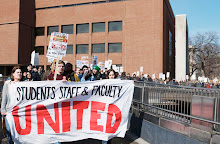Subscribe to:
Post Comments (Atom)
skip to main |
skip to sidebar

Reclaim the University of Minnesota!
RECLAIM THE U!
As the administration has come to dominate instead of to serve the university, intellectual and educational values have been displaced by market ones like "efficiency" and "productivity." Faculty and students have been commensurately marginalized in the governance of the institution. We do not say that the university ought to be inefficient or unproductive, but we do demand that values central to scholarly and scientific inquiry and education be restored to the center of the university's endeavors, including (indeed, especially) the management of its finances. Our efforts have a fivefold focus:
1. Governance. The university should be governed by those who carry out its mission of teaching, research, and public service. At present faculty have little meaningful role in making decisions that are handed down from central administration. This state of affairs results from manifold causes, faculty in generations gone by having ceded governance responsibilities to an ever-growing body of administrators. We the faculty must resume our proper role in making, rather than merely reacting to, the decisions that govern our work and our workplace.
2. Transparency in budgeting. The administration should make all information about the university's finances, including expenditures as well as revenue sources, readily available to the public in comprehensible form. At present it is difficult or even impossible to find out how the university spends most of the funds at its disposal, effectively prohibiting people without privileged access and knowledge from scrutinizing the administration's allocation of financial resources. (N.B.: All these resources are public funds once they enter the land-grant institution's coffers.) We recommend an independent audit to open the university's budget to such scrutiny.
3. Accountability for the administration. Every office within central administration should be required to provide to the public an account of what it does, what relation its work bears to the university's mission, and why it costs what it does.
4. Workload. The administration demands greater "productivity" from faculty and staff at the same time that it reduces the resources we need to produce anything and increases the burdens that hamper our work. If resources are withdrawn, our workload must be reduced, not increased. We do not want to do less teaching or less research, rather, we demand that unfunded mandates handed down by the administration be eliminated. Meanwhile, adequate support must be provided to enable efficient and productive work.
5. Integrity of the university. We reject the notion that the university can somehow achieve excellence by cutting programs, faculty positions, and curriculum. All disciplines and all modes of inquiry are interrelated, whether directly or distantly; to excise one element affects others, and ultimately damages the whole. This principle of intellectual integration is encapsulated in the motto of the University of Minnesota, commune vinculum omnibus artibus, which is a phrase derived from the argument of Cicero that the study of poetry is essential to a career in law. To unbind the arts from one another, as if any form of human inquiry can stand in isolation from every other, violates not merely the motto but the principle of the University's existence.
1. Governance. The university should be governed by those who carry out its mission of teaching, research, and public service. At present faculty have little meaningful role in making decisions that are handed down from central administration. This state of affairs results from manifold causes, faculty in generations gone by having ceded governance responsibilities to an ever-growing body of administrators. We the faculty must resume our proper role in making, rather than merely reacting to, the decisions that govern our work and our workplace.
2. Transparency in budgeting. The administration should make all information about the university's finances, including expenditures as well as revenue sources, readily available to the public in comprehensible form. At present it is difficult or even impossible to find out how the university spends most of the funds at its disposal, effectively prohibiting people without privileged access and knowledge from scrutinizing the administration's allocation of financial resources. (N.B.: All these resources are public funds once they enter the land-grant institution's coffers.) We recommend an independent audit to open the university's budget to such scrutiny.
3. Accountability for the administration. Every office within central administration should be required to provide to the public an account of what it does, what relation its work bears to the university's mission, and why it costs what it does.
4. Workload. The administration demands greater "productivity" from faculty and staff at the same time that it reduces the resources we need to produce anything and increases the burdens that hamper our work. If resources are withdrawn, our workload must be reduced, not increased. We do not want to do less teaching or less research, rather, we demand that unfunded mandates handed down by the administration be eliminated. Meanwhile, adequate support must be provided to enable efficient and productive work.
5. Integrity of the university. We reject the notion that the university can somehow achieve excellence by cutting programs, faculty positions, and curriculum. All disciplines and all modes of inquiry are interrelated, whether directly or distantly; to excise one element affects others, and ultimately damages the whole. This principle of intellectual integration is encapsulated in the motto of the University of Minnesota, commune vinculum omnibus artibus, which is a phrase derived from the argument of Cicero that the study of poetry is essential to a career in law. To unbind the arts from one another, as if any form of human inquiry can stand in isolation from every other, violates not merely the motto but the principle of the University's existence.

Statcounter
Followers
Blog Archive
-
▼
2010
(157)
-
▼
February
(21)
- A ‘Nice Experience’ or a Job?
- You say you want a reSolution...
- Bruininks appeals Legislature for lighter cuts
- Bonding bill battle...
- Bruininks speaks
- LETTER FROM CALIFORNIA
- Bye bye tenure!
- Pawlenty Cuts Deep to Balance Budget
- Study finds Public Discontent with Colleges
- Maybe the U needs to be audited?
- Is the legislature dis-ing the U?
- What are you doing...what can you no longer do?
- Beneath the U
- UMore Park...WTF???
- Applications are up...
- Consequences of the 2% raise
- The F word
- The cuts affect students, too!
- Uniting faculty
- Getting out in front of the cuts
- Report on meeting of faculty on February 8, 2010
-
▼
February
(21)

I wonder if the administration will try to make it seem that any attempt by faculty to avoid "sharing the pain" will result in more cuts amongst support staff and higher tuition increases? They like to pit groups against each other, and they have done so in the past (i.e. when the clerical, health care, and maintenance workers negotiate their contracts).
ReplyDeleteLayoffs sound like a great solution.. as long as they are limited to senior administrators making over 200,000 a year!
ReplyDeleteI've been following and participating in a number of struggles across the university over the past eight years (first and second AFSCME strike, General College, GradTRAC). Something that has always astounded me is how BAD faculty are at organzing. Too often we fetishize our teaching and research as political, spend all our time doing academic work and pat ourselves on our back for our politics. At the same time, however, the administration has been taking political action as well--"strategic positioning" being just one example. If we don't organize they're going to sweep the floor out from under us and prevent us from being able to the teaching and research we want to do.
ReplyDeleteAnonymous (1) - the divide and rule issue really important, I think. (Btw, folks can comment anonymously but with a unique name by choosing the Name/URL option--fill in a name, leave URL blank. Otherwise it is confusing with everyone being "Anonymous") Taking a strong stand AGAINST any pay raises, maybe even saying that faculty will not take raises if they are given to us, is not only the right thing to do but is also excellent PR. I think divide and rule issues deserve a separate post!
ReplyDeleteWhy isn't the administration concerned about how bad it looks to the public to be handing out raises of any kind (2 percent, 1 percent, or 1/2 of 1 percent) to "meritorious" faculty during a such a difficult economic time period?
ReplyDeleteIt makes absolutely no sense to give faculty a two percent raise while we are all expected to come up with more ways for cutting back in our units and Colleges. Faculty should refuse to take the 2 percent raise.
ReplyDeleteI agree with Fed Up. Faculty need to take a strong stand against 2 percent raises. It is the right thing to do and it's excellent PR. What about starting a petition to the President and the Regents?
ReplyDeleteSo, faculty get a 2 percent raise, and then, their pay is cut through a furlough? From a purely economic standpoint, this is not rational. So much for running the university like a business...
ReplyDelete